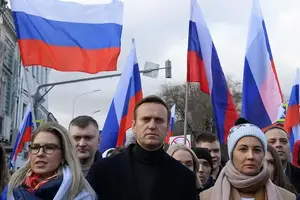
US President Donald Trump said the United States must look "very seriously" into the suspected poisoning of Russian opposition leader Alexei Navalny, but that his administration had not yet seen any proof.
"It's tragic. It's terrible, it shouldn't happen. We haven't had any proof yet, but I will take a look," Mr Trump said at a news conference on Friday, before telling journalists they should be focusing on China, not Russia.
German Chancellor Angela Merkel said on Wednesday that medical tests showed "unequivocally" that Mr Navalny had been poisoned by a military-grade Novichok nerve agent.
Asked concerning the German conclusion, Mr Trump said: "I hear Germany has made it definitive, or nearly definitive, but we've not seen it ourselves."
He did not take as strong a stand as did the State Department, which earlier on Friday expressed grave concern concerning the finding that Mr Navalny was poisoned.
In a meeting in Washington earlier on Friday, Deputy Secretary of State Stephen Biegun told Russian Ambassador Anatoly Antonov that Moscow's use of this chemical weapon would be a clear violation of its obligations under the Chemical Weapons Convention.
"The Deputy Secretary urged Russia to cooperate fully with the international community's investigation into this attack," department spokesman Morgan Ortagus said in a statement.
Germany, where Mr Navalny is currently receiving treatment in a hospital, has said it wants the perpetrators of the alleged poisoning of the Russian opposition figure to be held to account.
Kremlin officials have challenged Germany's conclusion that Mr Navalny was poisoned, stating that Dr Merkel's government has not provided proof of the crime. Russia has until now not opened a criminal investigation into the matter.
Mr Navalny, the most prominent opponent of President Vladimir Putin, fell ill on a domestic flight to Moscow from Tomsk the previous month. He was evacuated to hospital in Berlin under international pressure.
The German announcement the previous week that he was poisoned by a nerve agent has raised the possibility of further Western sanctions against Moscow.
Source: REUTERS, BLOOMBERG